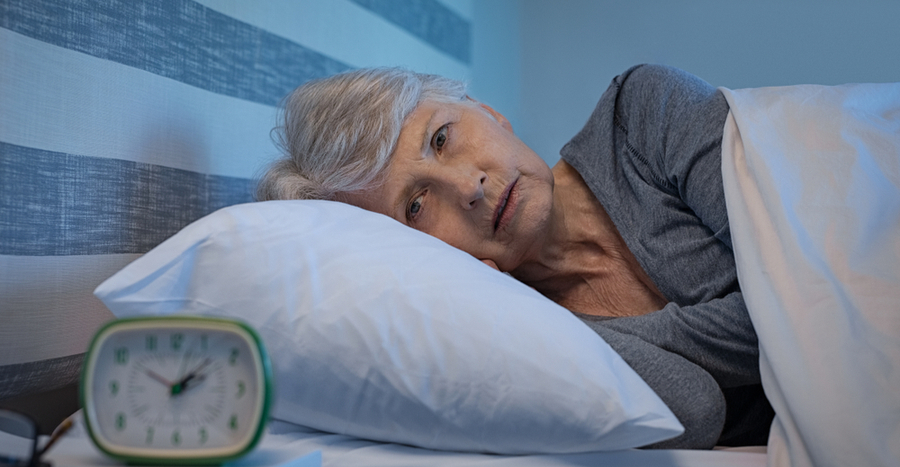Sleep & Fibromyalgia

Although many things conspire to prevent the miraculous healing affect of sleep, it remains a major contributor to our overall physical and emotional health throughout our lives. Sleep medicine research is continually contributing to our understanding of the profound affects caused by sleep deprivation. For instance, fibromyalgia was thought at one time to be caused by inflammation, although there was no evidence of inflammation or arthritis. Others theorized that it was a psychiatric condition and it is now believed that depression and anxiety are the result, not the cause. Today, there is better evidence that fibromyalgia is due to an abnormality of deep sleep.
What is Fibromyalgia?
Fibromyalgia is a common and disabling disorder affecting 2-4% of the population, women more often than men. Despite the condition’s frequency, the diagnosis is often missed. Patients with fibromyalgia usually ache all over, sleep poorly, are stiff on waking, and are tired all day. They are prone to headaches, memory and concentration problems, dizziness, numbness and tingling, itching, fluid retention, and crampy abdominal or pelvic pain and diarrhea.
What causes fibromyalgia?
This disorder often runs in families, suggesting an inherited predisposition. It may lie dormant until triggered by injury, stress, or sleep disturbance. It has been suggested that chronic fatigue and irritable bowel syndromes are all just different facets of the same underlying disorder. Minor trauma or changes in the weather, particularly cold or dampness, appear to exacerbate the muscle discomfort.
Abnormal brain waveforms have been found in deep sleep in many patients with fibromyalgia, as well as low levels of growth hormone, important in maintaining good muscle and other soft tissue health. The growth hormone is produced almost exclusively in deep sleep and its production is increased by exercise.
How is fibromyalgia diagnosed?
Any person who suspects they may have fibromyalgia as a result of a sleep disorder should ask their family doctor for a referral to a doctor who specializes in sleep disorders. If referred to a sleep specialist, the doctor will obtain a medical history and ask sleep-related questions, may perform a physical examination, and may ask to interview the patient’s bed partner.
During the physical examination, the physician will search for multiple tender points in characteristic locations, such as the neck muscles at the base of the skull, midway between the neck and shoulder, the muscle over the upper inner shoulder blade, below the side bone at the elbow, the upper outer buttock, the hip bone, just above the knee on the inside, the lower neck in front, and the edge of upper breast bone. To qualify for a diagnosis of fibromyalgia, patients much ache all over and have tenderness in at least 11 of 18 different spots when pressure is applied.
If the sleep specialist feels a sleep study is indicated to obtain a reading of deep sleep patterns to confirm the diagnosis, the patient may be referred to a sleep laboratory at the nearest hospital. The sleep study will involve a regular overnight polysomnogram to monitor the patient’s brain waves, muscle activity, leg and arm movements, heart rhythms, and other body functions during sleep. With this information, the doctor can confirm the patient’s diagnosis and begin the patient on an appropriate treatment plan.
How is fibromyalgia treated?
Taking medication by itself has relatively little effect on fibromyalgia symptoms. Successful treatment requires active involvement of the patient in their own care, including: (1) medication to improve deep sleep; (2) regular sleep hours and an adequate amount of sleep; (3) daily gentle aerobic exercise; (4) avoidance of undue physical and emotional stress; (5) treatment of any coexisting sleep disorders; and (6) patient education. If any of these steps are omitted, the chance of significant improvement is greatly reduced.
Patients with fibromyalgia should probably give up caffeine completely as even one cup in the morning can sometimes disrupt sleep at night and may also directly increase muscle pain and headaches. Eliminating alcohol consumption after your evening dinner and weight loss for those who are overweight may improve the quality of one’s sleep. Other sleep disorders that may aggravate fibromyalgia are obstructive sleep apnea (Part 2), snoring (Part 2), periodic limb movements (Part 3) and insomnia (Part 5).
